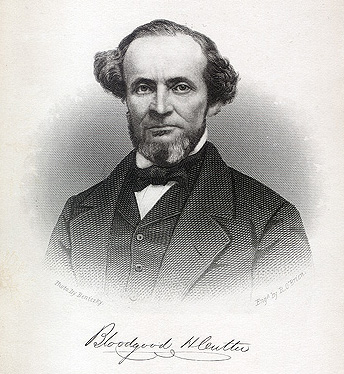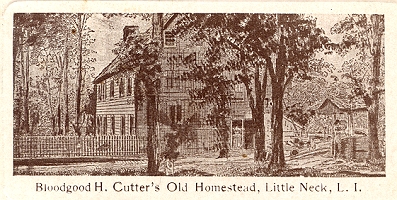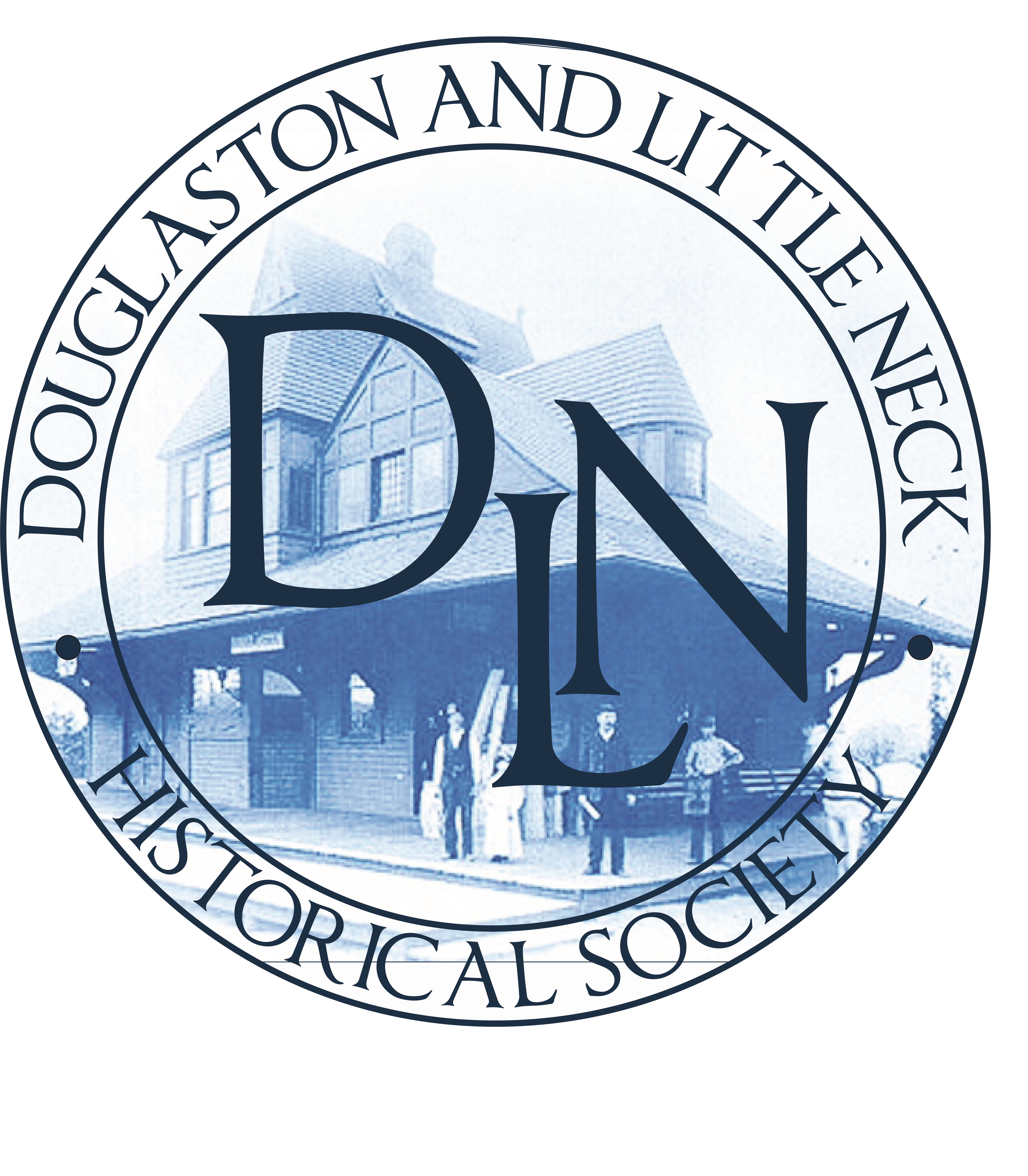FROM: THE CHRONICLE of LITTLE NECK and DOUGLASTON
- O. Bloodgood! Bloodgood! Do not weep!
- First I was called in death to sleep!
- O never did I think the time would come
- When I’d weep o’er my Bloodgood’s tomb!
 His poetic remembrances of Mark Twain in the “Poems” is recorded in the verse:
His poetic remembrances of Mark Twain in the “Poems” is recorded in the verse:
- One droll person there was on board,
- The passengers called him Mark Twain.
- He’d talk and write all sort of stuff,
- In his queer way it explain.
Mr. Cutter was best known to the Little Neck community as the man who owned the old mill which had been in Elijah Allen’s family as a possession for one hundred years before. It stood for many a year on the road where Little Neck turns to Great Neck and the spot is known as Cutter Mill Road (today’s Great Neck Road & Northern Boulevard). All his life he was a member of Zion Church and for many years a vestry man. He lies buried beside his wife in Zion Churchyard where a great stone cross marks their resting place. At his death he left a large estate, the greater part of which he bequeathed to The American Bible Society.
 Bloodgood Cutter was a boy of twelve at the time the foundation of Zion Church was laid and told this story some years after the raising:
Bloodgood Cutter was a boy of twelve at the time the foundation of Zion Church was laid and told this story some years after the raising:
- “When the church frame was completed, I remember a great preparation was made to raise the frame. The night before it looked very much like rain; indeed, I was fearful it would rain. I was very anxious to see it go up. My grandfather (Roe Haviland) made a consoling remark: that rain often fails in a drought. Sure enough, the next day proved fair. A great preparation was also made for feeding the crowd. A long table was set from the Alley Road south of the barn at the Van Zant Point corner (southwest corner of today’s Douglaston Pkwy. & Northern Blvd.), reaching to near the house where the old rector, Dr. Bear, afterward lived. In the evening we had a good old time feast with great rejoicing for the success in getting up the frame without accident. That was kept up till late at night.”
Mark Twain’s ‘Innocents Abroad’
Two Little Neck residents names are vividly immortalized by Mark Twin in his “Innocents Abroad.” This book tells the story of the “Quaker City” excursion which sailed from New York harbor on June 1, 1867. John A. Van Nostrand, who died in March, 1879, is the “Jack” of the story. He is introduced as follows:
- “One of our favorite youths, Jack, a splendid young fellow with a head full of good sense, and a pair of legs that were a wonder to look upon in the way of length and straightness, and slimness, used to report progress every morning in the most glowing and spirited way, and say: ‘Oh, I’m coming along bully! (he was a little given to slang in his happier moods), ‘I wrote ten pages in my journal last night – and you know I wrote nine the night before, and have twelve the night before that! Why, it’s only fun!”
- Of the other fellow passenger from Little Neck, Bloodgood Haviland Cutter, whom Mark dubbed “The Poet Lariat,” this more intimate record is taken from his “Note Books” of the time, published by Harper and Brothers:
- “He is 50 years old, and small for his age. He dresses in home spun, and is a simple minded, honest, old fashioned farmer with a strange proclivity for writing rhymes. He writes them on all possible subjects and gets them printed on slips of paper with his portrait at the head. These he will give to any man that comes along, whether he has anything against him or not. He has already written interminable poems on ‘The Good Ship Quaker City’ and an ‘Ode to the Ocean’ and ‘Recollections of the Pleasant Time on Deck Last Night, which pleasant time consisting in his reciting some 75 stanzas of his poetry to a large party of passengers convened on the upper deck.”
- ” ‘Many’s the time,’ (he said), I’ve had to leave my dinner and many’s the time I’ve had to get up in the night when it came on me. At such time as that, I can’t any more talk without rhyming than you could put fire to powder and it not go off. Why, bless me, this ship may go to the bottom any moment and drown us all, but but what of that?”
- “Whether we’re on the sea or the land ‘We’ve all got to go at word of command.'”
